RA Ibiza weekly: Ibiza Rocks, DJ Pippi
- PublishedFri, Jun 20, 2014, 10:35
- Words
- Share
- There's an alternative feel to this week's column, as we catch up with two veterans of the scene.
- The column goes a little off-piste this week, focusing on the life and times of one of the island's best-loved brands: Ibiza Rocks. We also sat down for an animated chat with DJ Pippi, as part of our new feature series, Ibiza Histories. Plus, we offer our take on recent events at the new Hard Rock Hotel, Space and DC-10.
Ibiza Rocks
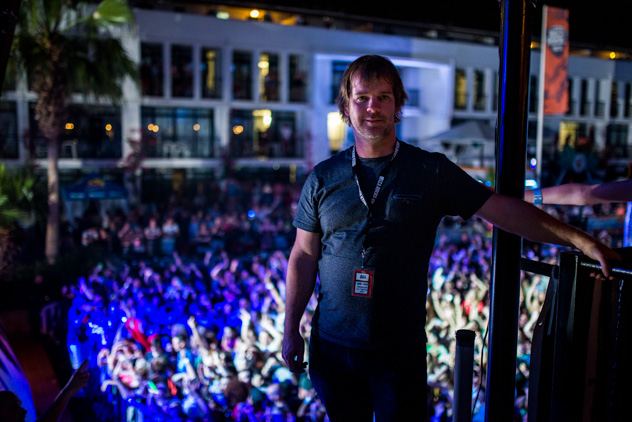 For all its dance music legacy, Ibiza's clubbing culture is rooted in rock & roll. As the legend goes, Alfredo, DJ Pippi and the like fused rock records with contemporary soul and pop to form the sun-kissed, trippy sound known as balearic. However, once the '90s kicked in, bringing with them house, techno and the explosive rise of the superstar DJ, rock music sank into the shadows and clubbing in Ibiza became something else entirely.
One of the defining dance parties of the era was Manumussion, a colossal, exuberant operation started in 1994 and run out of Ku (now Privilege) by two brothers from the north of England, Mike and Andy McKay. After the hype of the millennium had worn off, and with the '90s but a distant memory, Andy felt something needed shaking up. He started running a night in the back room of Manumission on Mondays, booking electronic bands and electro DJs. In 2005, the party went independent, moving to Friday nights. That party, run to this day by Andy and his wife Dawn Hindle, is Ibiza Rocks, one of the island's most recognisable music, accommodation and lifestyle brands.
Sitting down for breakfast with McKay at Pikes, the renowned hotel on the outskirts of San Antonio that now acts as Ibiza Rocks' unofficial HQ, he seemed excited to walk me through Ibiza Rocks' tumultuous history. Initially, the idea was to spice Manumission up a bit, booking bands like The Rapture in the back room, while using the Music Box, a smaller, DJ friendly space, to showcase upfront electro. "We were the first to host Ivan Smagghe, Ewan Pearson, M.A.N.D.Y... all of those guys. The Music Box was the first electro club on the island." Unable to pick up on just how big a sound that would become ("we dropped it 10 minutes before it exploded"), McKay decided to focus his efforts of live music, convinced that a burgeoning guitar scene in the UK would eventually make its way to the island. In 2005, they divorced from Manumission and set up in the back room of Privilege on Friday nights. "It was a disaster. But a good one. It was fantastic."
In his words, "we launched it for dance kids that wanted to rock and rock kids that wanted to dance. The problem was, the dance kids generally didn’t want to rock and the rock kids, well, they weren’t here. So we were left with a far smaller marker than we'd anticipated, populated mostly by the very few dance kids that wanted a night off. This mean that immediately it was militantly indie and we couldn’t play dance music. And that was the shock, that we couldn’t go much beyond Franz Ferdinand's 'Take Me Out.'" As a result, those early days were pretty desperate. "I remember we were begging people, trying to give them a free drink and free entrance, and still failing to get more than 100 in the venue."
In September of that year, however, things would change dramatically. Leeds band Kaiser Chiefs, rapidly gaining in popularity back home, had been booked. The show sold-out three days before the gig, so Mckay taped "sold-out" stickers to every poster on the island. "Suddenly this club night that no one even liked, playing a style of music that was offensive to most people, was sold-out. And those people that would never have gone in a million years, well now they couldn't go anyway, even if they wanted to. So of course, now they did want to go." The Ibiza Rocks sound, a mix of pop and indie rock, would soon infiltrate the Radio One playlist and blow up in a way no one could have expected.
For all its dance music legacy, Ibiza's clubbing culture is rooted in rock & roll. As the legend goes, Alfredo, DJ Pippi and the like fused rock records with contemporary soul and pop to form the sun-kissed, trippy sound known as balearic. However, once the '90s kicked in, bringing with them house, techno and the explosive rise of the superstar DJ, rock music sank into the shadows and clubbing in Ibiza became something else entirely.
One of the defining dance parties of the era was Manumussion, a colossal, exuberant operation started in 1994 and run out of Ku (now Privilege) by two brothers from the north of England, Mike and Andy McKay. After the hype of the millennium had worn off, and with the '90s but a distant memory, Andy felt something needed shaking up. He started running a night in the back room of Manumission on Mondays, booking electronic bands and electro DJs. In 2005, the party went independent, moving to Friday nights. That party, run to this day by Andy and his wife Dawn Hindle, is Ibiza Rocks, one of the island's most recognisable music, accommodation and lifestyle brands.
Sitting down for breakfast with McKay at Pikes, the renowned hotel on the outskirts of San Antonio that now acts as Ibiza Rocks' unofficial HQ, he seemed excited to walk me through Ibiza Rocks' tumultuous history. Initially, the idea was to spice Manumission up a bit, booking bands like The Rapture in the back room, while using the Music Box, a smaller, DJ friendly space, to showcase upfront electro. "We were the first to host Ivan Smagghe, Ewan Pearson, M.A.N.D.Y... all of those guys. The Music Box was the first electro club on the island." Unable to pick up on just how big a sound that would become ("we dropped it 10 minutes before it exploded"), McKay decided to focus his efforts of live music, convinced that a burgeoning guitar scene in the UK would eventually make its way to the island. In 2005, they divorced from Manumission and set up in the back room of Privilege on Friday nights. "It was a disaster. But a good one. It was fantastic."
In his words, "we launched it for dance kids that wanted to rock and rock kids that wanted to dance. The problem was, the dance kids generally didn’t want to rock and the rock kids, well, they weren’t here. So we were left with a far smaller marker than we'd anticipated, populated mostly by the very few dance kids that wanted a night off. This mean that immediately it was militantly indie and we couldn’t play dance music. And that was the shock, that we couldn’t go much beyond Franz Ferdinand's 'Take Me Out.'" As a result, those early days were pretty desperate. "I remember we were begging people, trying to give them a free drink and free entrance, and still failing to get more than 100 in the venue."
In September of that year, however, things would change dramatically. Leeds band Kaiser Chiefs, rapidly gaining in popularity back home, had been booked. The show sold-out three days before the gig, so Mckay taped "sold-out" stickers to every poster on the island. "Suddenly this club night that no one even liked, playing a style of music that was offensive to most people, was sold-out. And those people that would never have gone in a million years, well now they couldn't go anyway, even if they wanted to. So of course, now they did want to go." The Ibiza Rocks sound, a mix of pop and indie rock, would soon infiltrate the Radio One playlist and blow up in a way no one could have expected.
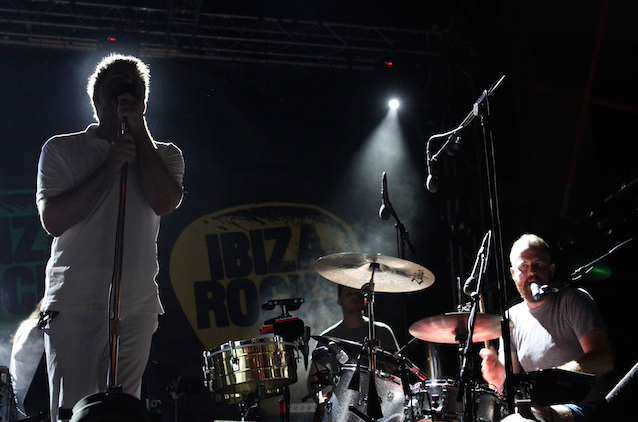 LCD Soundsystem at Ibiza Rocks, 2010.
In 2006, the party moved outside, to Bar M in San Antonio. It would prove an inspired move, as Ibiza Rocks took to running sporadic events—sometimes three per week, sometimes none—fronted by the likes of LCD Soundsystem, Arctic Monkeys and Kasabian. A wry smile appears across McKay's face as he reminisces, "when we had Mark Ronson and his 14-piece band, we had to rig some of them into the tree because the stage wasn’t big enough. It was phenomenal. But completely illegal." In Ibiza, under-the-radar success will only last so long. In July 2007, with the party at its peak, the police shut them down, in-between the soundcheck and the actual gig of The Streets Soundsystem with Mike Skinner. With a whole season of events in the diary, not to mention sponsorship from Sony Ericsson, a Channel 4 show and heavy involvement from Radio One, McKay was left with little choice but to stick to the schedule.
That summer, Ibiza Rocks made use of venues up and down the island. The seal pit at Gala Nights, now home to The Zoo Project, was one; the tennis court at Pikes another. "We always worked out three different locations to do the gig and tried to keep it really secret. We'd set up late and run a bus from Bar M, a magical mystery bus which wouldn’t tell anyone where we were going. The idea was to try and get the gig finished before the police turned up." Every gig was documented on prime-time British radio and TV, and the sponsors lapped up the brand's wild, illicit appeal. Somehow, they made it through the season.
The year after, in 2008, McKay and co. moved to their current home in San Antonio. Taking over the Club Paraiso Mediterraneo, Ibiza's first events hotel was born. For the first time in the island's history, guests would be able to enjoy a festival-sized show from the comfort of their own rooms. It was a concept that would soon catch on. For the time being, though, throwing outdoor parties was still illegal without a permit, and McKay was told by the authorities that the first gig at their new home would be their last. On the night, however, the music couldn't be heard from outside the hotel, leaving the police with no option but to leave them be.
Pushing their luck, McKay threw six more events out in the wilderness, this time in the San Rafael hippodrome. The police received so many complaints from the neighbours that it was considered the lesser of two evils to let Ibiza Rocks carry on in town, which at least saw money pouring into the local economy. Slowly, as time wore on, the laws became more and more lenient, until in 2012 they changed completely. Because of Ibiza Rocks' persistence, outdoor concerts were now permitted on a season-long scale, a move which proved instrumental in the rise of event hotels such as Ushuaia and, more recently, Hard Rock.
LCD Soundsystem at Ibiza Rocks, 2010.
In 2006, the party moved outside, to Bar M in San Antonio. It would prove an inspired move, as Ibiza Rocks took to running sporadic events—sometimes three per week, sometimes none—fronted by the likes of LCD Soundsystem, Arctic Monkeys and Kasabian. A wry smile appears across McKay's face as he reminisces, "when we had Mark Ronson and his 14-piece band, we had to rig some of them into the tree because the stage wasn’t big enough. It was phenomenal. But completely illegal." In Ibiza, under-the-radar success will only last so long. In July 2007, with the party at its peak, the police shut them down, in-between the soundcheck and the actual gig of The Streets Soundsystem with Mike Skinner. With a whole season of events in the diary, not to mention sponsorship from Sony Ericsson, a Channel 4 show and heavy involvement from Radio One, McKay was left with little choice but to stick to the schedule.
That summer, Ibiza Rocks made use of venues up and down the island. The seal pit at Gala Nights, now home to The Zoo Project, was one; the tennis court at Pikes another. "We always worked out three different locations to do the gig and tried to keep it really secret. We'd set up late and run a bus from Bar M, a magical mystery bus which wouldn’t tell anyone where we were going. The idea was to try and get the gig finished before the police turned up." Every gig was documented on prime-time British radio and TV, and the sponsors lapped up the brand's wild, illicit appeal. Somehow, they made it through the season.
The year after, in 2008, McKay and co. moved to their current home in San Antonio. Taking over the Club Paraiso Mediterraneo, Ibiza's first events hotel was born. For the first time in the island's history, guests would be able to enjoy a festival-sized show from the comfort of their own rooms. It was a concept that would soon catch on. For the time being, though, throwing outdoor parties was still illegal without a permit, and McKay was told by the authorities that the first gig at their new home would be their last. On the night, however, the music couldn't be heard from outside the hotel, leaving the police with no option but to leave them be.
Pushing their luck, McKay threw six more events out in the wilderness, this time in the San Rafael hippodrome. The police received so many complaints from the neighbours that it was considered the lesser of two evils to let Ibiza Rocks carry on in town, which at least saw money pouring into the local economy. Slowly, as time wore on, the laws became more and more lenient, until in 2012 they changed completely. Because of Ibiza Rocks' persistence, outdoor concerts were now permitted on a season-long scale, a move which proved instrumental in the rise of event hotels such as Ushuaia and, more recently, Hard Rock.
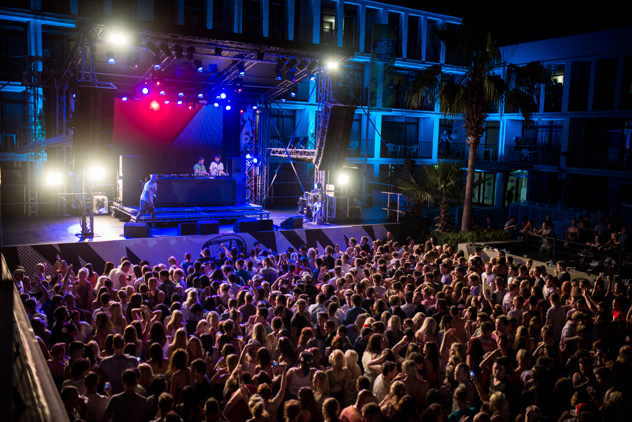 With the authorities finally on side, Ibiza Rocks set about unravelling the model that still exists today. In 2012, dance night W.A.R (We Are Rockstars) was added to the programme, brought in to capitalize on dance music's increasingly mainstream appeal. For years, McKay had been in the enviable position of being the only person in Ibiza promoting guitar music. While it was mainstream in the UK, on the island it was wholly alternative. Around 2011, however, dance would begin to dominate the charts like never before, powered by the ballooning popularity of EDM in the US. Suddenly, the kids wanted dance music and Ibiza Rocks was left at a crossroads.
"Initially we started blurring the boundaries of [Ibiza] Rocks, including the odd electronic live act, booking the odd DJ, which worked okay if they were big. But we got to the point where we thought we were watering down the essence of what Ibiza Rocks was, so we decided two years ago to launch an equivalent electronic dance night." Booking the likes of Skream, Major Lazer and Chase & Status, W.A.R would set a precedent for raucous UK sounds in Ibiza, a trend that British promoters Together would later make the basis of their Tuesday night party at Amnesia.
Today, the main hotel in San Antonio runs pretty much like clockwork. Of the two nights, W.A.R has been slightly busier so far this year, claims McKay, though he expects Ibiza Rocks to come out on top across the summer. In the last couple of years, as pop and dance has continued to move the masses, Ibiza Rocks has had to adapt, moving more eclectic than ever. This year, alongside new indie darlings Haim and Bombay Bicycle Club, you've got Rudimental, Madness and even US rapper Nas. Despite the chart-lean, the gigs still harbour a certain something. Not only is the sound great and the booze significantly cheaper, but the atmosphere—made up almost exclusively of young, tipsy British 20-somethings—is abuzz with energy.
But this year there's more to Ibiza Rocks than San Antonio. Mondays at Pacha is now home to Ibiza Rocks House, a night paying homage to Ibiza Rock's frivolous second home, Pikes. Owned by one of Ibiza's longest-serving veterans, Tony Pike, the boutique hotel was the hang-out for the many chic celebrities that used to visit the island in the '60s, '70s and '80s. The pool-side bar, for example, is named after Freddie Mercury, who famously celebrated his 41st birthday at the hotel. Walking around the place, it has a certain Alice In Wonderland vibe to it, a natural quirkiness.
With the authorities finally on side, Ibiza Rocks set about unravelling the model that still exists today. In 2012, dance night W.A.R (We Are Rockstars) was added to the programme, brought in to capitalize on dance music's increasingly mainstream appeal. For years, McKay had been in the enviable position of being the only person in Ibiza promoting guitar music. While it was mainstream in the UK, on the island it was wholly alternative. Around 2011, however, dance would begin to dominate the charts like never before, powered by the ballooning popularity of EDM in the US. Suddenly, the kids wanted dance music and Ibiza Rocks was left at a crossroads.
"Initially we started blurring the boundaries of [Ibiza] Rocks, including the odd electronic live act, booking the odd DJ, which worked okay if they were big. But we got to the point where we thought we were watering down the essence of what Ibiza Rocks was, so we decided two years ago to launch an equivalent electronic dance night." Booking the likes of Skream, Major Lazer and Chase & Status, W.A.R would set a precedent for raucous UK sounds in Ibiza, a trend that British promoters Together would later make the basis of their Tuesday night party at Amnesia.
Today, the main hotel in San Antonio runs pretty much like clockwork. Of the two nights, W.A.R has been slightly busier so far this year, claims McKay, though he expects Ibiza Rocks to come out on top across the summer. In the last couple of years, as pop and dance has continued to move the masses, Ibiza Rocks has had to adapt, moving more eclectic than ever. This year, alongside new indie darlings Haim and Bombay Bicycle Club, you've got Rudimental, Madness and even US rapper Nas. Despite the chart-lean, the gigs still harbour a certain something. Not only is the sound great and the booze significantly cheaper, but the atmosphere—made up almost exclusively of young, tipsy British 20-somethings—is abuzz with energy.
But this year there's more to Ibiza Rocks than San Antonio. Mondays at Pacha is now home to Ibiza Rocks House, a night paying homage to Ibiza Rock's frivolous second home, Pikes. Owned by one of Ibiza's longest-serving veterans, Tony Pike, the boutique hotel was the hang-out for the many chic celebrities that used to visit the island in the '60s, '70s and '80s. The pool-side bar, for example, is named after Freddie Mercury, who famously celebrated his 41st birthday at the hotel. Walking around the place, it has a certain Alice In Wonderland vibe to it, a natural quirkiness.
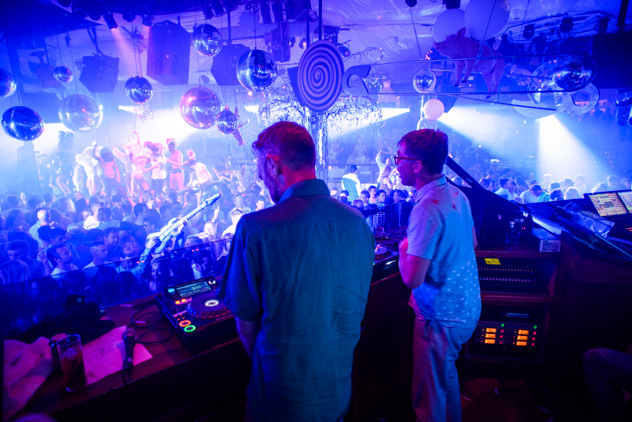 Since 2009, McKay and co. have run the hotel (re-christened Ibiza Rocks House) as a refuge from the noise of San Antonio, renting out rooms to friends and industry acquaintances, as well as housing the bands that fly over. Among those in the know, it's also become something of a party spot, with the self-titled Ibiza Rocks House its most popular venture. Aimed at a slightly more mature crowd, these parties are wacky, colourful occasions, with guests encouraged to make the most of the dressing-up room, ball pit and oversized Wendy house. The soundtrack to these affairs has always been classic house music.
Always looking for ways to expand the business, McKay entered negotiations with Pacha last year about potentially doing a party. "There was some discussion about whether we did something with Manumission, but in the end we told them the only way it would work is if it’s completely rooted in Ibiza Rocks, and the only thing we felt was suitable was to extend the personality of the Pikes parties." Marking 20 years since McKay landed on the island, the Pacha party is something of a personal milestone, in more ways than one. "In 1994, we originally had our heart set on hosting Manumission at Pacha, but they weren't keen for a weekly party, so we went to Ku. To have come full circle, two decades later, is, well, funny."
Walking into Pacha a couple of Mondays back, the party made total sense. As Basement Jaxx turned out rich, danceable club music, the main room felt alive, adorned with all manner of random, sparkly decorations. A life-size stag hung from the ceiling, while grown men in bunny suits bounced about a four-poster bed, pillow fighting. On stage, it was impossible to tell the actual dancers from members of the audience, so exuberant were the costumes. Meanwhile, I was told that in the toilet, spontaneous karaoke sessions were taking place. Everything, from the music to the theatrics, to the crazy, carefree vibe, suited Pacha. DJ-wise, there's a strong focus on the masters, with Kevin Saunderson, Kenny Dope, DJ Pierre and Giorgio Moroder all set to feature. But for McKay, though the DJs are important, there's more to it than that.
"A huge proportion of club nights on this island now aren't club nights, they're concerts. And at seven hours or so, bloody long ones at that. I think the balance has shifted a little bit too far, and you’ve got too many nightclubs where everybody is pointing in one direction and they're worshiping the DJ, or the brand really. In most cases, the music is secondary, it's retrospective enjoyment, it’s about bragging rights." At this point he pauses. "I just think the time has come for clubs to recognise the power of the party, of the atmosphere and the energy. What we’ve done with the Mondays is say yes, there are some great DJs, but it's more than that. It's about the people. It's that sort of balearic spirit. It's about moving away from VIP culture and shifting the equilibrium back a bit. So what are we fighting for? To push the authenticity back into the market, because it is in danger of getting lost."
And so far it's going well?, I ask. "They are delighted with it. As it's one of the least expensive nights in the club the expectations aren't massive, so we don’t have a huge pressure to pack numbers in, it can organically grow. The thing I love is that the staff love it. When it becomes their favourite night, you know that’s the beginning of something."
Ibiza Histories: DJ Pippi
Running sporadically across the season, Ibiza Histories will aim to dig a little deeper into the specific island experiences that have come to define some of Ibiza's most influential figures. Who better to start with than one of the scene's original craftsmen: DJ Pippi.
Since 2009, McKay and co. have run the hotel (re-christened Ibiza Rocks House) as a refuge from the noise of San Antonio, renting out rooms to friends and industry acquaintances, as well as housing the bands that fly over. Among those in the know, it's also become something of a party spot, with the self-titled Ibiza Rocks House its most popular venture. Aimed at a slightly more mature crowd, these parties are wacky, colourful occasions, with guests encouraged to make the most of the dressing-up room, ball pit and oversized Wendy house. The soundtrack to these affairs has always been classic house music.
Always looking for ways to expand the business, McKay entered negotiations with Pacha last year about potentially doing a party. "There was some discussion about whether we did something with Manumission, but in the end we told them the only way it would work is if it’s completely rooted in Ibiza Rocks, and the only thing we felt was suitable was to extend the personality of the Pikes parties." Marking 20 years since McKay landed on the island, the Pacha party is something of a personal milestone, in more ways than one. "In 1994, we originally had our heart set on hosting Manumission at Pacha, but they weren't keen for a weekly party, so we went to Ku. To have come full circle, two decades later, is, well, funny."
Walking into Pacha a couple of Mondays back, the party made total sense. As Basement Jaxx turned out rich, danceable club music, the main room felt alive, adorned with all manner of random, sparkly decorations. A life-size stag hung from the ceiling, while grown men in bunny suits bounced about a four-poster bed, pillow fighting. On stage, it was impossible to tell the actual dancers from members of the audience, so exuberant were the costumes. Meanwhile, I was told that in the toilet, spontaneous karaoke sessions were taking place. Everything, from the music to the theatrics, to the crazy, carefree vibe, suited Pacha. DJ-wise, there's a strong focus on the masters, with Kevin Saunderson, Kenny Dope, DJ Pierre and Giorgio Moroder all set to feature. But for McKay, though the DJs are important, there's more to it than that.
"A huge proportion of club nights on this island now aren't club nights, they're concerts. And at seven hours or so, bloody long ones at that. I think the balance has shifted a little bit too far, and you’ve got too many nightclubs where everybody is pointing in one direction and they're worshiping the DJ, or the brand really. In most cases, the music is secondary, it's retrospective enjoyment, it’s about bragging rights." At this point he pauses. "I just think the time has come for clubs to recognise the power of the party, of the atmosphere and the energy. What we’ve done with the Mondays is say yes, there are some great DJs, but it's more than that. It's about the people. It's that sort of balearic spirit. It's about moving away from VIP culture and shifting the equilibrium back a bit. So what are we fighting for? To push the authenticity back into the market, because it is in danger of getting lost."
And so far it's going well?, I ask. "They are delighted with it. As it's one of the least expensive nights in the club the expectations aren't massive, so we don’t have a huge pressure to pack numbers in, it can organically grow. The thing I love is that the staff love it. When it becomes their favourite night, you know that’s the beginning of something."
Ibiza Histories: DJ Pippi
Running sporadically across the season, Ibiza Histories will aim to dig a little deeper into the specific island experiences that have come to define some of Ibiza's most influential figures. Who better to start with than one of the scene's original craftsmen: DJ Pippi.
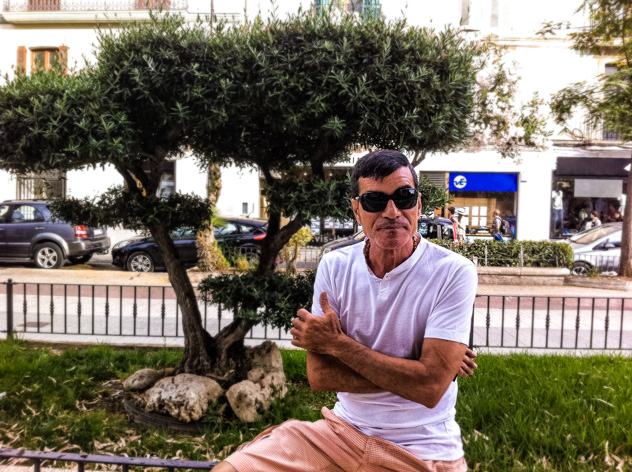 Giuseppe Nuzzo, AKA DJ Pippi, is one of the key figures in Ibiza's musical history. Arriving here as a wide-eyed 23-year-old, he would soon evolve into one of the best-loved DJs on the island. Attributed with introducing the locals to the likes of Prince, Marvin Gaye and James Brown, we caught up with Pippi over a coffee to unearth some of the finer details of his past.
Let's start at the beginning. You first came to Ibiza in '79, as a tourist from Germany right?
Yes. I was DJing at a place called Malesh in Düsseldorf, which later became Checkers. Claudia Schiffer was discovered there, in '82. And then in '84, Pacha offered me a job DJing and I left everything and moved to Ibiza.
What was it about Ibiza at that time that attracted you?
When I first arrived it felt as if I'd found the place I'd always hoped existed. Before that, I had travelled a lot, looking for somewhere which suited me both as a person and as an DJ. Immediately I saw that Ibiza had something unique to it. In my case, I fell in love with Pacha, which was honestly like something I'd dreamt up. I was bringing a style of music that the island wasn't familiar with, which is what led to my opportunity.
So you arrived here and immediately started spinning at Pacha full-time?
Yes, for three years until '87.
And you played every night of the week?
Of course! Up until the mid-2000s, that was always the case at Pacha. Every DJ worked the whole night, from open until close. Every night was a Saturday. Not like now...
So would you play similar music each night?
Well in those days you didn't have seven different parties for each night of the week. Pacha had its residents and we played every night. Of course, it was a similar sound each time, but made up of different records, which could shift the mood considerably. I was lucky to have so much music to choose from that no night was the same.
So what time would you start?
When the club opened and I'd finish when it closed. Roughly seven or eight hours. It was hard work, but it was great fun and the island was a constant source of inspiration.
Did you find playing there easy?
Yes, because of the style of music I was playing.
Which was primarily black music, right?
Exactly, music with a little bit more funk and soul, plus some new wave and new romantic bits. My contemporaries were playing a lot more psychedelic stuff, a lot more rock and pop. So I brought something completely new to the table, especially for the Ibicencos, who had never heard that music before. The foreign crowd were more clued up. When I arrived, other DJs started mixing up the styles and created what became known as the balearic sound. The thing is, back in those days, you could really count on your favourite artists to put out good records. Whether it was Prince, Sade, James Brown, whoever...
But it wouldn't just be you all night?
No, there were usually two or three of us. When I started I played alongside an iconic DJ called Cesar de Melero and also Joan Ribas, and we'd take it in turns to spin. When we thought the people wanted something new, the other would take over. We worked together though, soundtracking the night as a whole. If you weren't paying attention, you wouldn't even notice we'd switched.
Who were the other main DJs on the scene back then?
You can count them on one hand. Myself, Alfredo, Jose Padilla and then Giovanni in San Antonio, who passed away. Then there was Clara da Costa (AKA Miss Bisto) from the UK. I admired her a lot; she was the first British woman to DJ on the island. And then Cesar de Melero and Joan Ribas who I mentioned above, and Leo Mas. And we were all friends.
Giuseppe Nuzzo, AKA DJ Pippi, is one of the key figures in Ibiza's musical history. Arriving here as a wide-eyed 23-year-old, he would soon evolve into one of the best-loved DJs on the island. Attributed with introducing the locals to the likes of Prince, Marvin Gaye and James Brown, we caught up with Pippi over a coffee to unearth some of the finer details of his past.
Let's start at the beginning. You first came to Ibiza in '79, as a tourist from Germany right?
Yes. I was DJing at a place called Malesh in Düsseldorf, which later became Checkers. Claudia Schiffer was discovered there, in '82. And then in '84, Pacha offered me a job DJing and I left everything and moved to Ibiza.
What was it about Ibiza at that time that attracted you?
When I first arrived it felt as if I'd found the place I'd always hoped existed. Before that, I had travelled a lot, looking for somewhere which suited me both as a person and as an DJ. Immediately I saw that Ibiza had something unique to it. In my case, I fell in love with Pacha, which was honestly like something I'd dreamt up. I was bringing a style of music that the island wasn't familiar with, which is what led to my opportunity.
So you arrived here and immediately started spinning at Pacha full-time?
Yes, for three years until '87.
And you played every night of the week?
Of course! Up until the mid-2000s, that was always the case at Pacha. Every DJ worked the whole night, from open until close. Every night was a Saturday. Not like now...
So would you play similar music each night?
Well in those days you didn't have seven different parties for each night of the week. Pacha had its residents and we played every night. Of course, it was a similar sound each time, but made up of different records, which could shift the mood considerably. I was lucky to have so much music to choose from that no night was the same.
So what time would you start?
When the club opened and I'd finish when it closed. Roughly seven or eight hours. It was hard work, but it was great fun and the island was a constant source of inspiration.
Did you find playing there easy?
Yes, because of the style of music I was playing.
Which was primarily black music, right?
Exactly, music with a little bit more funk and soul, plus some new wave and new romantic bits. My contemporaries were playing a lot more psychedelic stuff, a lot more rock and pop. So I brought something completely new to the table, especially for the Ibicencos, who had never heard that music before. The foreign crowd were more clued up. When I arrived, other DJs started mixing up the styles and created what became known as the balearic sound. The thing is, back in those days, you could really count on your favourite artists to put out good records. Whether it was Prince, Sade, James Brown, whoever...
But it wouldn't just be you all night?
No, there were usually two or three of us. When I started I played alongside an iconic DJ called Cesar de Melero and also Joan Ribas, and we'd take it in turns to spin. When we thought the people wanted something new, the other would take over. We worked together though, soundtracking the night as a whole. If you weren't paying attention, you wouldn't even notice we'd switched.
Who were the other main DJs on the scene back then?
You can count them on one hand. Myself, Alfredo, Jose Padilla and then Giovanni in San Antonio, who passed away. Then there was Clara da Costa (AKA Miss Bisto) from the UK. I admired her a lot; she was the first British woman to DJ on the island. And then Cesar de Melero and Joan Ribas who I mentioned above, and Leo Mas. And we were all friends.
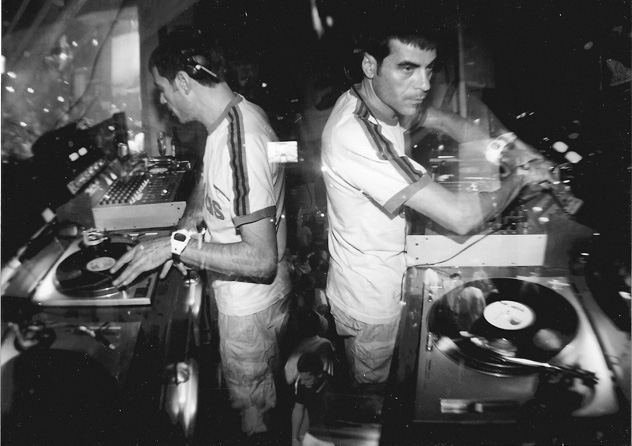 DJ Pippi at Pacha, 1997.
How advanced was your mixing?
In all honesty, no one on the island could mix like I could. In those days you had no effects machines, so I'd find ways to create my own, using two copies of the same records for phasing, or flanging. Not everyone had those skills. I was very spontaneous and the crowd used to love it. It was quite a unique style; emotive, yet fun.
And what was the vibe on the dance floor?
It was amazing. Back then, Ibiza was only visited by a select few, so you had the best Italians, the best Germans, the best French. There was such a strong atmosphere in the club, such a real sense of community and togetherness. Everyone was equal and rubbing shoulders, from the drug-addict to the richest man inside. And it was quite an intellectual crowd; you had writers, actors, musicians. People with a certain class. And of a certain age. Students didn't come to Ibiza. There were no chartered flights. Only a select strand of society knew about the island. It was underground.
And was DJing well-paid back then?
We weren't paid vast sums of money but for that era, we earned enough to live a good life. Plus, when you're young, those things don't concern you so much. You're more involved in your creative side, the rest wasn't really important.
And mixtapes were a big thing, right?
Yeah, huge. That was big business at the time. You could sell a mixtape and earn more than you would in a month behind the decks. In those days, tapes would go for between $500-1000.
And these were live recordings?
Yeah, you'd get a guy come up to you and say, 'look that last hour was amazing, I want it.' It wasn't really what we were about but then they'd come in with some ridiculous offer and we'd give in.
So when you moved to Ku (now Privilege) in '88, was it very different?
Yeah totally. It was like the Garden Of Eden in there and of course it was open-air. I loved playing there. In those days, every venue had such a strong sense of identity. It was when I was at Ku that house and acid house first started creeping in, which was incredible. In my opinion, those years gave fruit to the best dance music that's ever been written. And then Ku closed down and I moved back to Pacha, where I stayed for the next ten years.
When did you notice the island start to transition into a new era?
Well, it didn't happen overnight. But things began changing when foreign promoters started introducing new ideas. In the early days, this was kind of exciting, except that what happened was it spiralled out of control. Now, anyone can turn up and try to sell you something. But when, for example, Ministry Of Sound came to the island, it was amazing. They brought with them the kinds of DJs that we'd never encountered before, really talented guys.
And when DJ culture took off in Ibiza, did your role behind the decks change?
I was still the resident, but there were now guests that would play the main slots. A couple of nights a week, Ministry or Renaissance would take over the club, and I'd warm up or close. I really enjoyed that. Suddenly I had the opportunity to play records before Frankie Knuckles or John Digweed or David Morales. It opened my eyes and ears up to a lot, and also introduced me to a different public.
This week on the island
DJ Pippi at Pacha, 1997.
How advanced was your mixing?
In all honesty, no one on the island could mix like I could. In those days you had no effects machines, so I'd find ways to create my own, using two copies of the same records for phasing, or flanging. Not everyone had those skills. I was very spontaneous and the crowd used to love it. It was quite a unique style; emotive, yet fun.
And what was the vibe on the dance floor?
It was amazing. Back then, Ibiza was only visited by a select few, so you had the best Italians, the best Germans, the best French. There was such a strong atmosphere in the club, such a real sense of community and togetherness. Everyone was equal and rubbing shoulders, from the drug-addict to the richest man inside. And it was quite an intellectual crowd; you had writers, actors, musicians. People with a certain class. And of a certain age. Students didn't come to Ibiza. There were no chartered flights. Only a select strand of society knew about the island. It was underground.
And was DJing well-paid back then?
We weren't paid vast sums of money but for that era, we earned enough to live a good life. Plus, when you're young, those things don't concern you so much. You're more involved in your creative side, the rest wasn't really important.
And mixtapes were a big thing, right?
Yeah, huge. That was big business at the time. You could sell a mixtape and earn more than you would in a month behind the decks. In those days, tapes would go for between $500-1000.
And these were live recordings?
Yeah, you'd get a guy come up to you and say, 'look that last hour was amazing, I want it.' It wasn't really what we were about but then they'd come in with some ridiculous offer and we'd give in.
So when you moved to Ku (now Privilege) in '88, was it very different?
Yeah totally. It was like the Garden Of Eden in there and of course it was open-air. I loved playing there. In those days, every venue had such a strong sense of identity. It was when I was at Ku that house and acid house first started creeping in, which was incredible. In my opinion, those years gave fruit to the best dance music that's ever been written. And then Ku closed down and I moved back to Pacha, where I stayed for the next ten years.
When did you notice the island start to transition into a new era?
Well, it didn't happen overnight. But things began changing when foreign promoters started introducing new ideas. In the early days, this was kind of exciting, except that what happened was it spiralled out of control. Now, anyone can turn up and try to sell you something. But when, for example, Ministry Of Sound came to the island, it was amazing. They brought with them the kinds of DJs that we'd never encountered before, really talented guys.
And when DJ culture took off in Ibiza, did your role behind the decks change?
I was still the resident, but there were now guests that would play the main slots. A couple of nights a week, Ministry or Renaissance would take over the club, and I'd warm up or close. I really enjoyed that. Suddenly I had the opportunity to play records before Frankie Knuckles or John Digweed or David Morales. It opened my eyes and ears up to a lot, and also introduced me to a different public.
This week on the island
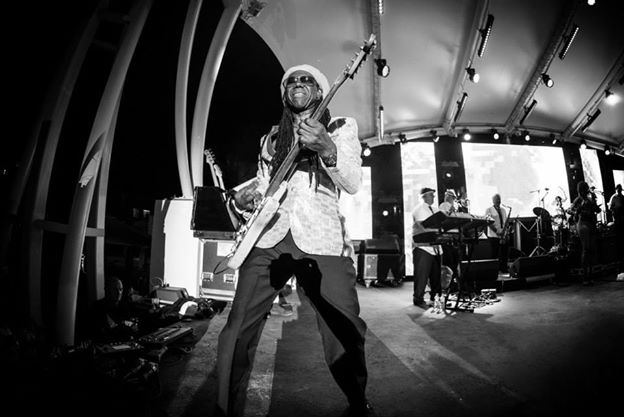 This Is Hard Rock opening at Hard Rock Hotel
Landing a stones-throw away from Ushuaia and its neighbouring Tower, the Hard Rock Hotel is the latest five-star example of a changing Ibiza. Like Ushuaia, it was purpose-built to host concerts, though their target market is significantly older: Neneh Cherry, UB40, Kylie Minogue and, bizarrely, Placebo, will all feature at some point this summer. Before all that, it was left up to new island darling Nile Rodgers and his seminal band Chic to inaugurate the This Is Hard Rock series last Friday.
In keeping with the more mature crowd, the Hard Rock felt a lot classier than its gleaming white neighbour. In fact, it has a lot more in common with Pacha's Destino venue; soft lighting, tan decking and palm trees give the space that same breezy, Caribbean feel. And the stage, complete with signature arch, is almost identical. Warming up at the opening were Masters At Work, whose tough, disco-tinged house carried perfect amounts of funk and energy. Immediately tripling the dosage of each, Nile Rodgers and co. launched straight into the likes of "Everybody Dance" and other well-worn classics. It's hard to know what to say about Chic at this point—their act is such a vibrant, well-oiled machine. As young and old danced in tandem, smiling from ear to ear, one thing was clear: there's no better band for an opening party.
This Is Hard Rock opening at Hard Rock Hotel
Landing a stones-throw away from Ushuaia and its neighbouring Tower, the Hard Rock Hotel is the latest five-star example of a changing Ibiza. Like Ushuaia, it was purpose-built to host concerts, though their target market is significantly older: Neneh Cherry, UB40, Kylie Minogue and, bizarrely, Placebo, will all feature at some point this summer. Before all that, it was left up to new island darling Nile Rodgers and his seminal band Chic to inaugurate the This Is Hard Rock series last Friday.
In keeping with the more mature crowd, the Hard Rock felt a lot classier than its gleaming white neighbour. In fact, it has a lot more in common with Pacha's Destino venue; soft lighting, tan decking and palm trees give the space that same breezy, Caribbean feel. And the stage, complete with signature arch, is almost identical. Warming up at the opening were Masters At Work, whose tough, disco-tinged house carried perfect amounts of funk and energy. Immediately tripling the dosage of each, Nile Rodgers and co. launched straight into the likes of "Everybody Dance" and other well-worn classics. It's hard to know what to say about Chic at this point—their act is such a vibrant, well-oiled machine. As young and old danced in tandem, smiling from ear to ear, one thing was clear: there's no better band for an opening party.
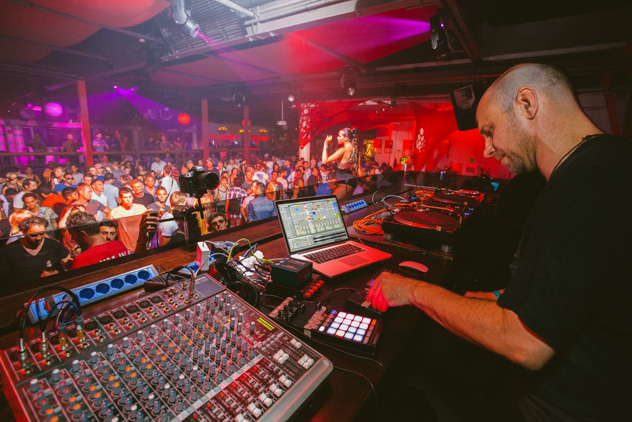 Kehakuma + Elrow at Space
With half the island away working or partying in Barcelona, the weekend of Sónar festival is a typically slow one for the Ibiza clubs. On the flip side, however, it also means that every house and techno act worth their salt is in the area, with many of them keen to squeeze in a second gig before they head back home. A situation arises, then, where parties boast some of the best lineups of the season, and yet the dance floor remains sparse. This is exactly what went down in the Terrace at Kehakuma + Elrow last Saturday, where Levon Vincent, Mike Huckaby, Henrik Schwarz and DVS1 all convened after their respective gigs across the water.
Huckaby was first up, setting an early pace with cuts of rampant, upbeat techno. Schwarz followed, presenting an updated (and long overdue) version of his live show. During his set, the room was at its fullest, grooving gently to his brand of synth-heavy deep house. His remix of Code 718's "Equinox" provided the night's standout moment. Levon Vincent took Schwarz's percussive lead, dropping several slices of wicked, bullish techno, among them Cajmere and Derrick Carter's "Dream States." True to his uncompromising style, however, several dryer tools followed, leaving the dance floor at its most desolate. It's a shame, because from start to finish, the music was as good as it gets in Ibiza. As one girl lamented in my ear, the island was simply missing the kind of people that dug deeper sounds—most of them were in Barcelona.
Kehakuma + Elrow at Space
With half the island away working or partying in Barcelona, the weekend of Sónar festival is a typically slow one for the Ibiza clubs. On the flip side, however, it also means that every house and techno act worth their salt is in the area, with many of them keen to squeeze in a second gig before they head back home. A situation arises, then, where parties boast some of the best lineups of the season, and yet the dance floor remains sparse. This is exactly what went down in the Terrace at Kehakuma + Elrow last Saturday, where Levon Vincent, Mike Huckaby, Henrik Schwarz and DVS1 all convened after their respective gigs across the water.
Huckaby was first up, setting an early pace with cuts of rampant, upbeat techno. Schwarz followed, presenting an updated (and long overdue) version of his live show. During his set, the room was at its fullest, grooving gently to his brand of synth-heavy deep house. His remix of Code 718's "Equinox" provided the night's standout moment. Levon Vincent took Schwarz's percussive lead, dropping several slices of wicked, bullish techno, among them Cajmere and Derrick Carter's "Dream States." True to his uncompromising style, however, several dryer tools followed, leaving the dance floor at its most desolate. It's a shame, because from start to finish, the music was as good as it gets in Ibiza. As one girl lamented in my ear, the island was simply missing the kind of people that dug deeper sounds—most of them were in Barcelona.
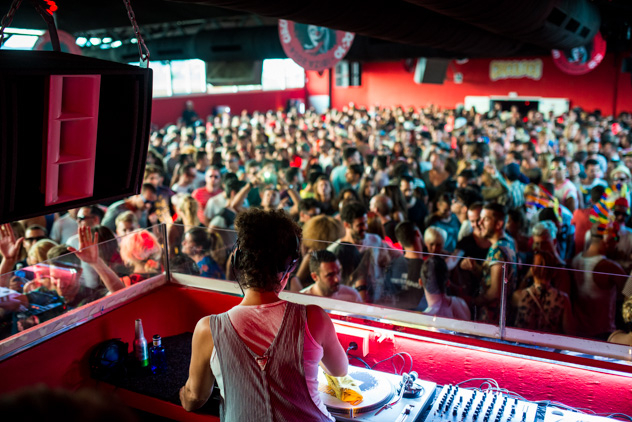 Circoloco at DC-10
The best way to combat the dip in numbers caused by Sónar is to throw your party on the Monday after the festival has finished. Circoloco, much for the same reasons as Kehakuma, were able to call on the best of their residents, with Jamie Jones, Seth Troxler, Dixon, Tale Of Us and Damian Lazarus all performing. The latter, sporting a bowler het and bushy beard, closed the Garden with a flurry of ethnic-tinged house cuts, including his own Qawwali-inspired single "Lover's Eyes (Mohe Pi Ki Najariya.)" In the Terrace, Cassy was settling into what would prove the night's best set. Playing markedly hard-edged, if still suitably breezy, techno, she kept the vibe gritty and groovy throughout. A razor-sharp remix of Byron Stingly's "Get Up" was among the highlights.
Dixon came next, followed by Tale Of Us. Both were well received, and yet something about their sets felt a little safe. Having such defined sounds can, at times, be a hinderance: there seems to be little room for divergence or experimentation. The two even crossed paths at one point, both dropping Âme's remix of Dan Croll's "Nowhere." The same can't be said for Seth Troxler, who opened with the high-pitched wailings of Rennie Foster's "Midnight Sun," before baring naked the trippy, cosmic contents of his record box. His set was equal parts sparky and unpredictable, underpinned by a constant barrage of thudding basslines. Even he, however, didn't manage to upstage Cassy.
Elsewhere...
Circoloco at DC-10
The best way to combat the dip in numbers caused by Sónar is to throw your party on the Monday after the festival has finished. Circoloco, much for the same reasons as Kehakuma, were able to call on the best of their residents, with Jamie Jones, Seth Troxler, Dixon, Tale Of Us and Damian Lazarus all performing. The latter, sporting a bowler het and bushy beard, closed the Garden with a flurry of ethnic-tinged house cuts, including his own Qawwali-inspired single "Lover's Eyes (Mohe Pi Ki Najariya.)" In the Terrace, Cassy was settling into what would prove the night's best set. Playing markedly hard-edged, if still suitably breezy, techno, she kept the vibe gritty and groovy throughout. A razor-sharp remix of Byron Stingly's "Get Up" was among the highlights.
Dixon came next, followed by Tale Of Us. Both were well received, and yet something about their sets felt a little safe. Having such defined sounds can, at times, be a hinderance: there seems to be little room for divergence or experimentation. The two even crossed paths at one point, both dropping Âme's remix of Dan Croll's "Nowhere." The same can't be said for Seth Troxler, who opened with the high-pitched wailings of Rennie Foster's "Midnight Sun," before baring naked the trippy, cosmic contents of his record box. His set was equal parts sparky and unpredictable, underpinned by a constant barrage of thudding basslines. Even he, however, didn't manage to upstage Cassy.
Elsewhere...
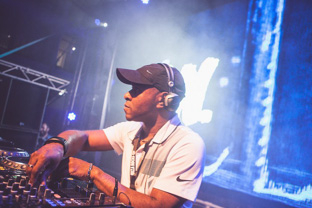 DJ EZ works the mixer at Ibiza Rocks' Friday night venture, W.A.R.
DJ EZ works the mixer at Ibiza Rocks' Friday night venture, W.A.R.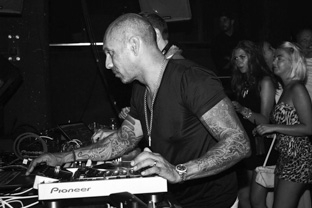 A lean looking David Morales lines up his next track at the second edition of Glitterbox last Saturday. View gallery
A lean looking David Morales lines up his next track at the second edition of Glitterbox last Saturday. View gallery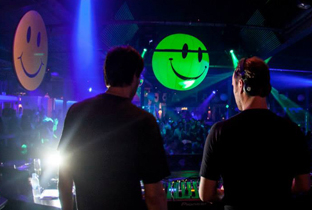 Roman Flügel and Michael Meyer survey the floor during their back-to-back set in the Terraza last Sunday.View gallery
Roman Flügel and Michael Meyer survey the floor during their back-to-back set in the Terraza last Sunday.View gallery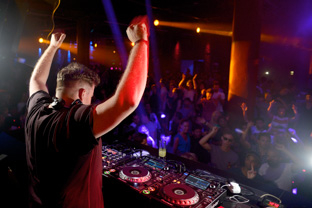 Eats Everything salutes the Main Room crowd at his first of two Cocoon dates. View gallery
Eats Everything salutes the Main Room crowd at his first of two Cocoon dates. View gallery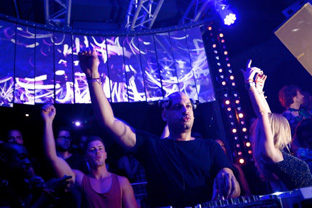 Dennis Ferrer commands the crowd's attention at Defected, joined on the night by Nick Curly and Krankbrother. View gallery
Dennis Ferrer commands the crowd's attention at Defected, joined on the night by Nick Curly and Krankbrother. View gallery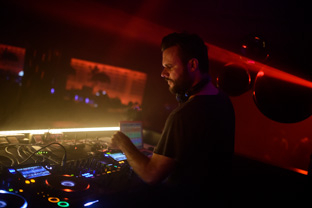 Tensnake looks pensive during his headline set for Creche on Tuesday.View galleryPhoto credit: LCD Soundsystem - La Skimal This Is Hard Rock - James Chapman Kehakuma + Elrow - Nel G Photography W.A.R. - Luke Dyson Glitterbox - Phrank.net We Love... - Nel G Photography Cocoon - Phrank.net Defected - Phrank.net All others - Tasya Menaker For more information on what's happening on the island in 2014, check out our comprehensive Ibiza guide below.
Tensnake looks pensive during his headline set for Creche on Tuesday.View galleryPhoto credit: LCD Soundsystem - La Skimal This Is Hard Rock - James Chapman Kehakuma + Elrow - Nel G Photography W.A.R. - Luke Dyson Glitterbox - Phrank.net We Love... - Nel G Photography Cocoon - Phrank.net Defected - Phrank.net All others - Tasya Menaker For more information on what's happening on the island in 2014, check out our comprehensive Ibiza guide below.